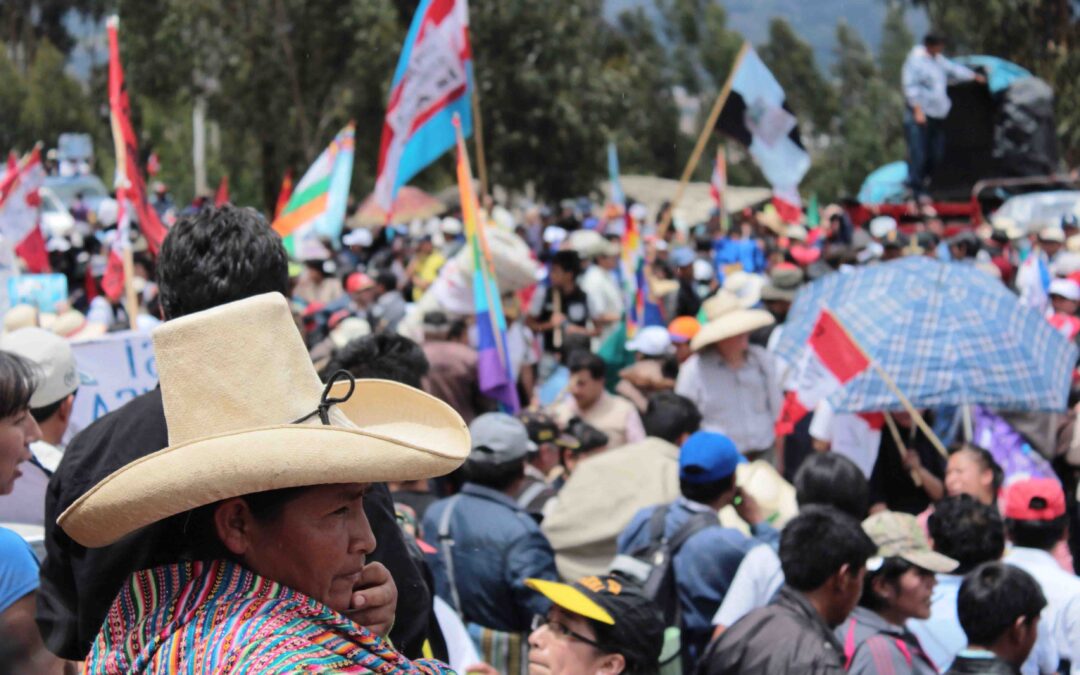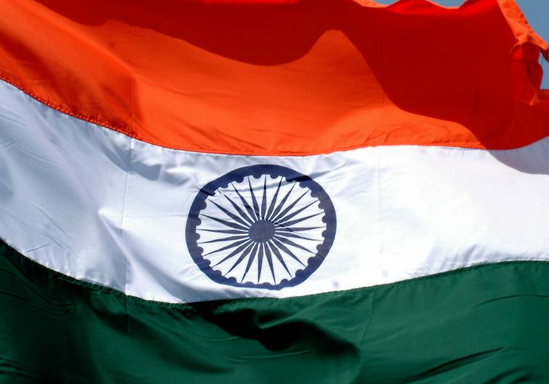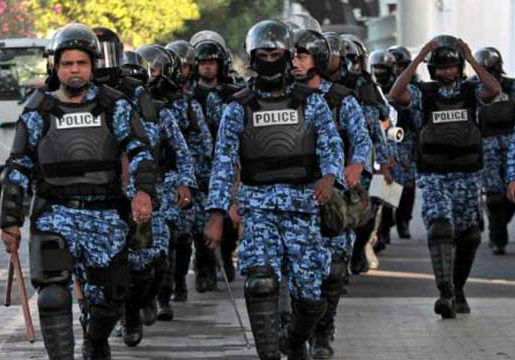
Nov 13, 2015 | News
The Peruvian authorities must revise a number of its laws and policies to better protect economic, social and cultural rights (ESCR) in the country, the ICJ says.
The call comes at the end of a one-week mission by the ICJ to gather information on and assess the impact of extractive industries on the economic, social and cultural rights of local populations, especially peasant and indigenous communities.
In particular, the ICJ is concerned at the adverse human rights impact of “Ley 30230” that aims at facilitating investment.
While investment can make an important contribution to the realization of human rights, the ICJ considers that this particular law effectively leads to a degradation of human rights by lowering social and environmental protection standards.
The ICJ does welcome the enactment of protective legislation by Peru, including that protecting and implementing the right to free, prior and informed consent of indigenous peoples or regulating the use of force by the police.
However, the ICJ notes these laws are often not effectively implemented in practice.
During the mission the ICJ verified information on the increasing number of violent conflict and social protests relating to mining projects.
“A large proportion of current social conflicts in the country is taking place in areas of extractive industrial activities. With a trend to lower the protection of economic and social rights and the environment in order to facilitate investment, there is a high risk that violent conflict will increase even more,” said Sandra Ratjen, Senior Legal Adviser for ICJ’s Programme on Economic, Social and Cultural Rights.
“There is a gap between Peru’s international law obligations to respect and protect human rights and the systematic threats to the enjoyment of rights, such as the right to water, to health or to housing, or to free and prior, informed consent that communities in mining areas are facing,” she added.
The ICJ is particularly concerned at the alleged unlawful use of lethal force to suppress demonstrations and social protests in mining areas such as in the recent case of Las Bambas.
The ICJ received information from various sources that in some instances the security forces had used such force in contravention of the principles of necessity and proportionality.
The ICJ urges the Peruvian authorities to take the following measures to strengthen the protection of Economic, Social and Cultural Rights in the country:
- maintain and strengthen the national laws and policies protecting human rights, particularly economic, social and cultural rights and the environment;
- accordingly revise legislation that obstructs the State to comply with its international human rights obligations, including those related to the realization of rights such as the right to decent work the rights to health and safe water or the right to be protected against forced evictions;
- fully ensure the free exercise of the right to peaceful assembly and of freedom of expression of individuals and peoples, including human rights defenders.
Additional information:
The ICJ mission included: María Clara Galvis, a Colombian lawyer specialized in international human rights law and Professor at Universidad Externado de Colombia ; Rafael Uzcátegui, a Venezuelan sociologist and Coordinator General of the Venezuelan Programme of Education and Action on Human Rights (PROVEA); Sandra Ratjen, Senior Legal Adviser for ICJ’s Programme on Economic, Social and Cultural Rights; and Olivier van Bogaert, ICJ Director of Media and Communications.
The delegation met with authorities from various Peruvian Ministries, representatives from extractive companies, cooperation agencies, human rights non governmental organizations, trade unions and community-based organizations.
In December, the ICJ will release a final report containing its findings and recommendations on the situation of economic, cultural and social rights in the context of extractive activities and the rise of social conflicts in Peru.
Contact:
Sandra Ratjen, Senior Legal Adviser for ICJ’s Programme on Economic, Social and Cultural Rights, t: +55 96 48 13 628; e: sandra.ratjen(a)icj.org
Peru-ESCR mission-News-Press release-2015-SPA (full press release in PDF, Spanish)
Photo credit: Jonas Hulsens

Nov 11, 2015 | News
While welcoming the Maldives government’s revocation of the emergency yesterday, the arbitrary manner in which the emergency was first imposed and then suddenly revoked within the span of a week reflects a deeper erosion of the rule of law in the country, the ICJ said today.
On 10 November, a week after declaring a 30-day state of emergency, the Maldives lifted the emergency reportedly because authorities had arrested several people in connection with an alleged plot to “use dangerous weapons and explosives”, thereby neutralizing the purported national security threat cited as the grounds for the emergency.
Maldivian authorities have not provided any information as to who or how many individuals were arrested or the nature of the charges.
“The imposition of a state of emergency is not a political tool to be used willy-nilly as a matter of convenience to suspend human rights protections and suppress political opposition,” said Nikhil Narayan, ICJ’s South Asia Senior Legal Adviser.
“A state of emergency that suspends constitutional rights is not to be declared lightly,” he added. “It has serious implications for human rights and the rule of law in the country, and must only be invoked in the most extreme situations and in accordance with international law.”
International law expressly permits derogations of certain human rights only in times of public emergency which threatens ‘the life of the nation’.
“Declaring a 30-day emergency and then suddenly lifting it a week later only reinforces the serious concerns previously raised as to the legitimacy of the emergency in the first place, and speaks to the larger rule of law crisis in the country,” Narayan said.
The emergency decree issued by the Maldives government last week suspended several constitutional rights, including the right to freedom of peaceful assembly, and reduced the constitutionally mandated period for the vice president to respond to impeachment charges from 14 to 7 days.
The opposition Maldivian Democratic Party (MDP) had planned a public anti-government demonstration for 6 November, two days prior to which the emergency was declared.
Meanwhile, the vice president was removed from his post the day after the emergency decree, 5 November, in a swift and seemingly arbitrary impeachment hearing.
“The circumstances surrounding events in the Maldives this past week clearly suggest that the government was using the emergency as a ploy to prevent the planned opposition rally and to eliminate the vice president as a political threat,” said Narayan.
The emergency also granted sweeping powers of search, arrest and detention without warrant to the police, who reportedly raided several buildings and arrested an unknown number of individuals under its emergency powers over the past week.
“The Maldives government cannot flout international law by invoking emergency powers as a means to deny the due process rights of the vice president and others arrested or detained for alleged crimes,” added Narayan. “The government must ensure that the individuals arrested during the emergency are afforded their full fair trial and due process rights in accordance with international law.”
Additional Information:
The ICJ previously raised concerns that the alleged grounds for the emergency did not appear to establish a threat to the life of the as required by the high threshold set by international law, and could not in any event justify the complete suspension of constitutional rights.
In August 2015, following a joint fact-finding mission to the Maldives, the ICJ and South Asians for Human Rights (SAHR) documented the breakdown of the rule of law and human rights in the Maldives in a 35-page report, Justice Adrift: Rule of Law and the Political Crisis in the Maldives.
Contact:
Nikhil Narayan, ICJ Senior Legal Adviser for South Asia, t: +977 9813187821 ; e: nikhil.narayan(a)icj.org

Nov 7, 2015 | News
The ICJ, Lawyers for Human Rights Swaziland (LHR(S), Lawyers for Human Rights South Africa (LHR), and Southern Africa Litigation Centre (SALC) organized a training on strategic litigation for lawyers and human rights defenders from 6-7 November 2015 in Ezulwini.
The training was intended to empower Swazi lawyers and human rights defenders with tools for legal empowerment through litigation.
Further the training provided an opportunity for introducing the participants to international, regional and domestic mechanisms for strategic litigation and analysis of strategic litigation cases, opportunities and challenges in Swaziland.
Participants were drawn from different private law firms, human rights organisations, and the office of the Attorney General and women’s rights organisations.
To nurture regional peer learning and approaches the President of the Law Society of Lesotho Advocate Shale gave the key note presentation borrowing on lessons from other regions and Lesotho.
Resources persons included David Cote (LHR), Caroline James (SALC), Otto Saki (ICJ) and Thabiso Mavuso (Swaziland).
The expected impact is that increasingly lawyers and human rights defenders will take up strategic litigation as part of contributing to the achievement of systemic change and positive enforcement of fundamental rights and freedoms.
This training was held with the generous support of the European Union (EU) through the EU Delegation to Swaziland.
Contact:
Arnold Tsunga, ICJ Regional Director for Africa, t: +27 73 131 8411, e: arnold.tsunga(a)icj.org
Mandla Mkhwanazi LHR Swaziland Chairperson, t: +268 7602 6320, e: m.z.mkhwanazi(a)swazi.net
Caroline James, Lawyer, Southern Africa Litigation Centre t: 27 72 200 1813, e: CarolineJ(a)salc.org.za
David Cote, Programme Manager: Strategic Litigation Programme, LHR (South Africa) t: +27 11 339 1960, e: david(a)lhr.org.za

Nov 6, 2015 | E-bulletin on counter-terrorism & human rights, News
Read the 97th issue of ICJ’s monthly newsletter on proposed and actual changes in counter-terrorism laws, policies and practices and their impact on human rights at the national, regional and international levels. The E-Bulletin on Counter-Terrorism and Human...

Nov 5, 2015 | News
On the 15th anniversary of Irom Sharmila’s hunger strike, the International Commission of Jurists calls on the Indian government to repeal the Armed Forces Special Powers Act without further delay.
Irom Sharmila began a hunger strike in November 2000, calling for the repeal of the AFSPA, following the unlawful killing of 10 civilians by security forces purportedly acting under it in Malom.
“The AFSPA has facilitated gross human rights violations by the armed forces in the areas in which it is operational,” Sam Zarifi, Asia-Pacific Director of the ICJ said. “It is a repressive and draconian law that should have no place in today’s India”.
Once an area is declared “disturbed” under the AFSPA, armed forces are given a range of “special powers”. These include the power to arrest without warrant, to enter and search any premises, and in certain circumstances, “fire upon or otherwise use force, even to the causing of death”. These and other vaguely framed provisions give armed forces broad powers that are inconsistent with the government’s obligations to respect the right to life.
In addition to leading to many unlawful killings in the areas in which it has been in effect, the provisions of the AFSPA have also facilitated torture, rape and enforced disappearances.
“The AFSPA has created a culture of impunity, shielding security forces from accountability in India for crimes under international law, and making it impossible for victims of human rights violations to access justice”, Sam Zarifi said.
Under the AFSPA, governmental permission, or sanction, is required before any member of the armed forces can be prosecuted for crimes in a civilian court. Decisions regarding sanction take many years, and as yet, no member of the armed forces has been prosecuted in a civilian court.
The Indian government has often justified the need for the AFSPA as necessary to address terrorism and militancy in “disturbed areas”. “International law requires and experience shows that effective counter- terrorism measures must reinforce human rights, and not undermine and violate them,” said Sam Zarifi.
Calls for the repeal or amendment of the AFSPA –including from official bodies – have come from near and far for a number of years.
Several UN human rights bodies have recommended that the AFSPA be repealed or significantly amended. These include the Committee on the Elimination of Discrimination against Women (2014), the Special Rapporteur on violence against women (2014), the Special Rapporteur on extrajudicial, summary or arbitrary executions (in 2013 and again in 2015), the Special Rapporteur on the situation of human rights defenders (2012), the Committee on the Elimination of Racial Discrimination (2007), and the UN Human Rights Committee (1997).
In recent years, prominent Indian bodies have recognized the brutality of the AFSPA and echoed demands for repeal or amendment. The Justice Jeevan Reddy Committee set up by the Government of India to review the working of the AFSPA, has advocated its repeal. The Fifth Report of the Second Administrative Reforms Commission seconded this recommendation.
The Verma Commission, set up by the government following the gang rape in Delhi in 2012, called for the repeal of sanction provisions under the AFSPA as they relate to sexual offences. In 2015, a High Level Committee on the Status of Women also reportedly advocated its repeal.
In 2012, the Extra Judicial Execution Victims Family Association, Manipur (EEVFAM) filed a petition at the Supreme Court of India, alleging that between 1979 and 2012, 1528 people were extra-judicially executed by security forces in Manipur.
A court-appointed fact-finding commission – popularly known as the Santosh Hegde Commission – studied 6 of these cases, and found that the deaths were not lawful.
In its report, the Hegde Commission agreed with the observation of the Jeevan Reddy Commission, that the AFSPA had become “a symbol of oppression, an object of hate, and an instrument of discrimination and high-handedness.”
The case is still pending in the Supreme Court.
Contact:
Sam Zarifi, ICJ Asia Pacific Regional Director (Bangkok), t: +66 807819002; email: sam.zarifi(a)icj.org
Sanhita Ambast, ICJ International Legal Advisor (Delhi), t: +91 9810962193; email: Sanhita.ambast(a)icj.org

Nov 4, 2015 | News
The government of Maldives must immediately revoke its suspension of human rights protections under the state of emergency declared today and restore the rule of law to the country, said the ICJ.
The Maldivian government suspended a range of constitutional protections under a 30-day state of emergency declared on 4 November, citing a threat to national security based on the allegation that “some groups are planning to use … dangerous weapons and explosives,” according to a translated version of the emergency decree obtained by the ICJ.
“The complete suspension of constitutional protections for human rights such as the right to liberty and right to free assembly goes far beyond anything that could be justified by the alleged grounds cited by the government,” said Nikhil Narayan, ICJ’s South Asia Senior Legal Adviser.
“International law strictly regulates attempts by governments to suspend or otherwise derogate from human rights on the grounds of emergency,” he added.
Article 4 of the International Covenant on Civil and Political Rights (ICCPR), to which the Maldives is a State Party, expressly permits derogations only for certain human rights, and then only ‘in time of public emergency which threatens the life of the nation’.
“Maldivian authorities have not come close to explaining how the current situation constitutes a threat to the ‘life of the nation’, the high threshold set by international law for the derogation of rights in times of emergency,” Narayan said.
According to the emergency decree, the constitutionally protected rights that have been suspended during the state of emergency are, among others:
- Article 19: “A citizen is free to engage in any conduct or activity that is not expressly prohibited by Islamic Shari’ah or by law. No control or restraint may be exercised against any person unless it is expressly authorised by law.”
- Article 24: “Everyone has the right to respect for his private and family life, his home and his private communications. Every person must respect these rights with respect to others.”
- Article 31: “Every person employed in the Maldives and all other workers have the freedom to stop work and to strike in order to protest.”
- Article 32: “Everyone has the right to freedom of peaceful assembly without prior permission of the state.”
- Article 41(a): “Every citizen has the freedom to enter, remain in and leave the Maldives, and to travel within the Maldives.”
- Article 45: “Everyone has the right not to be arbitrarily detained, arrested or imprisoned except as provided by law enacted by the People’s Majlis in accordance with Article 16 of this Constitution.”
- Article 47(a) and (b): “(a) No person shall be subject to search or seizure unless there is reasonable cause. (b) Residential property shall be inviolable and shall not be entered without the consent of the resident, except to prevent immediate and serious harm to life or property, or under the express authorisation of an order of the Court.”
“The basic prohibition against arbitrary detention and imprisonment can never be derogated from,” Narayan said.
The declaration of the state of emergency also seems to target the country’s vice president, whom the president appears to regard as a political threat. The vice president is facing impeachment proceedings for his alleged role in the boat explosion which the government claims was caused by a bomb as part of a deliberate assassination attempt.
The emergency decree reduces the period provided under Article 100 of the Maldives Constitution for the vice president to respond to the impeachment charges from 14 days to 7 days.
“There seems to be a clear political motive in arbitrarily reducing the vice president’s procedural rights in the impeachment process,” added Narayan.
Additional information
The alleged threat cited by the Maldivian government refers to the announcement that Maldivian security forces had discovered weapons and explosives in two areas, and that some additional weapons were missing.
These allegations followed the purported discovery of an explosive device near the president’s palace on Monday that, following closely on last month’s explosion on a boat carrying the president and his wife, the government claims is part of an alleged assassination attempt on the president.
The government rejected the findings of an FBI investigation into the earlier boat explosion which ruled out the possibility that it was caused by a bomb.
In August 2015, following a joint fact-finding mission to the Maldives, the ICJ and South Asians for Human Rights (SAHR) documented the breakdown of the rule of law and human rights in the Maldives in a 35-page report, Justice Adrift: Rule of Law and the Political Crisis in the Maldives.
Contact:
Nikhil Narayan, ICJ Senior Legal Adviser for South Asia, t: +977 9813187821 ; e: nikhil.narayan(a)icj.org










